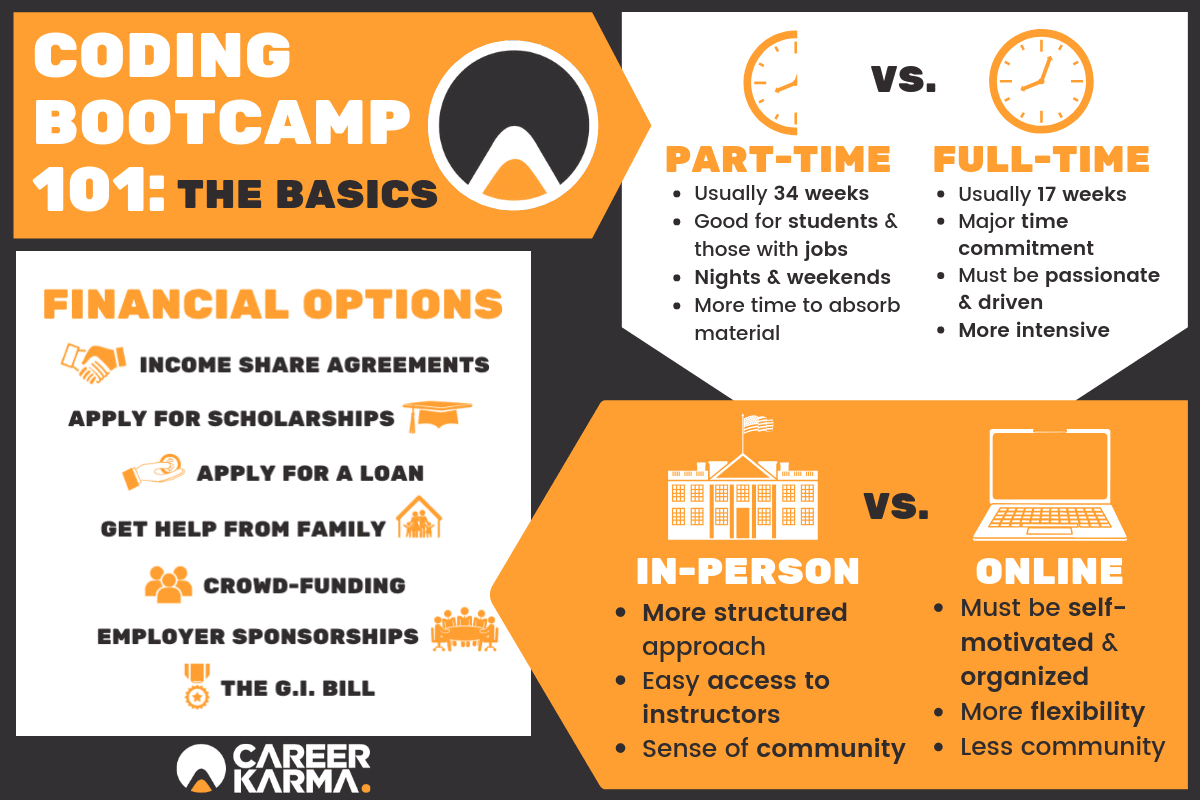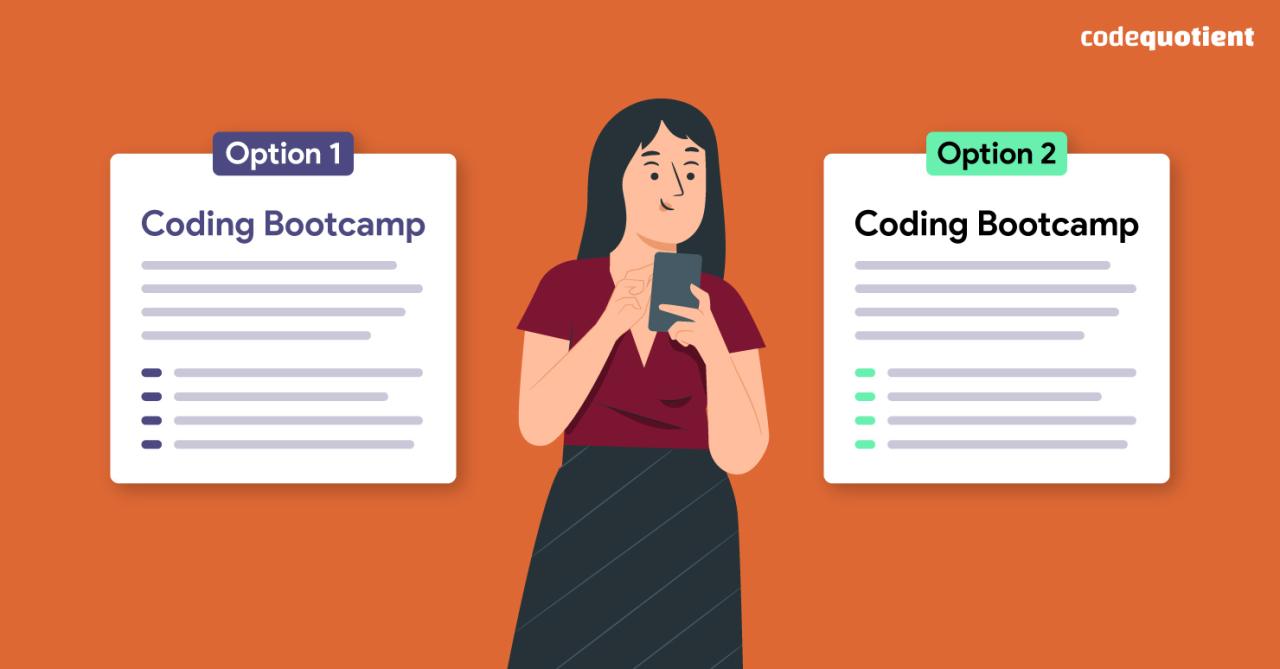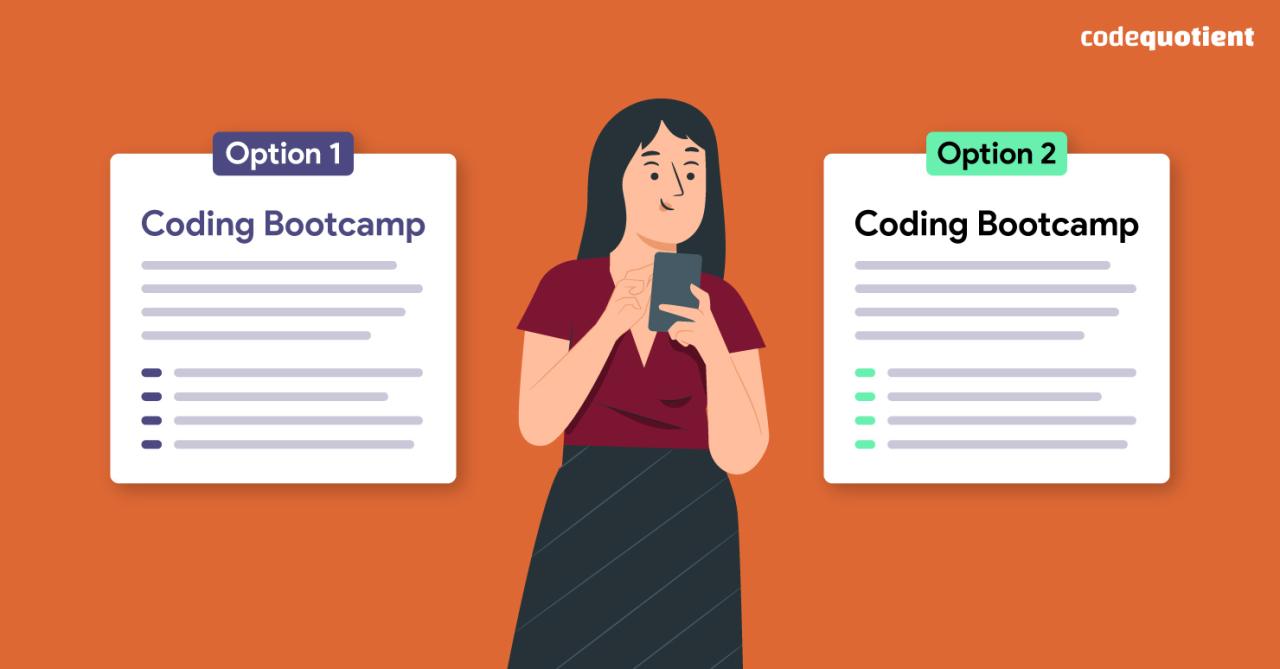Financial Considerations and Return on Investment: Is A Coding Bootcamp Right For Me

Choosing a coding bootcamp is a significant financial decision. Understanding the costs involved and the potential return on your investment is crucial to making an informed choice. This section will break down the financial aspects of bootcamp attendance, helping you assess its viability for your personal circumstances.
Bootcamp Costs
The cost of a coding bootcamp varies significantly depending on factors such as location, program length, and the specific curriculum offered. Tuition fees typically range from $10,000 to $20,000, though some programs can cost considerably more or less. Beyond tuition, you should budget for living expenses, including rent, utilities, groceries, and transportation. These costs are highly dependent on your location and lifestyle but could easily add another $5,000 to $15,000 annually. Finally, account for additional fees like application fees, materials costs (books, software subscriptions), and potential travel expenses if the bootcamp is not in your local area. A realistic budget should encompass all these potential costs.
Financing Options
Several financing options exist to help cover the costs of a coding bootcamp. Many bootcamps offer payment plans, allowing you to spread the tuition cost over several months or years. Income Share Agreements (ISAs) are another option, where you pay a percentage of your income after you secure a job following the program. This can reduce upfront costs but ties your payments to your future earnings. Traditional student loans can also be used, though it’s crucial to understand the interest rates and repayment terms before committing. Finally, exploring scholarships and grants specifically for coding bootcamps can significantly reduce your overall financial burden. Many organizations offer scholarships based on merit, need, or specific demographic criteria.
Return on Investment (ROI) Calculation
Calculating the ROI of a coding bootcamp involves comparing the total cost of the program with the increase in your earning potential. First, determine the total cost (tuition + living expenses + other fees). Next, estimate your potential salary increase after completing the bootcamp. This estimate should be based on research of average salaries for graduates of similar programs in your target geographic location. Then, calculate the difference between your potential post-bootcamp salary and your pre-bootcamp salary. Finally, use the following formula to calculate ROI:
ROI = ( (Post-Bootcamp Salary – Pre-Bootcamp Salary) * Number of Years Employed ) / Total Cost of Bootcamp
For example, if the total cost is $25,000, your pre-bootcamp salary is $40,000, and your post-bootcamp salary is $80,000, and you plan to work in this field for 5 years, your ROI would be: ( ($80,000 – $40,000) * 5 ) / $25,000 = 80%. This calculation shows a significant return on investment, but remember this is a simplified model and actual results may vary.
Cost and Potential Earnings Comparison
The following table compares the cost and potential earnings of three hypothetical bootcamps. Remember that these are illustrative examples and actual figures can vary widely.
| Bootcamp | Tuition | Estimated Living Expenses (1 year) | Average Graduate Salary (1st year) |
|---|---|---|---|
| Bootcamp A | $12,000 | $10,000 | $70,000 |
| Bootcamp B | $15,000 | $12,000 | $85,000 |
| Bootcamp C | $18,000 | $15,000 | $95,000 |
Curriculum and Skill Development

Choosing a coding bootcamp requires careful consideration of its curriculum and the skills it promises to develop. The intensity and focus of these programs mean a well-structured curriculum is crucial for career success. A thorough review of what’s offered will help you determine if a particular bootcamp aligns with your career goals and learning style.
Bootcamps vary significantly in their curriculum design and the technologies they emphasize. Some prioritize full-stack development, covering both front-end and back-end technologies, while others specialize in areas like data science, cybersecurity, or mobile app development. The specific programming languages taught will also differ; some might focus on Python, JavaScript, and React, while others may emphasize Java, C++, or Go. This diversity reflects the evolving demands of the tech industry and the different career paths available to graduates.
Programming Languages and Technologies Covered
Many bootcamps offer a comprehensive curriculum encompassing several programming languages and technologies. For example, a full-stack development bootcamp might cover HTML, CSS, and JavaScript for front-end development, alongside back-end languages like Python, Node.js, or Ruby on Rails, and database technologies such as SQL or NoSQL databases like MongoDB. Specialized bootcamps, however, may focus more narrowly on a specific technology stack relevant to a particular industry niche. For instance, a data science bootcamp might concentrate on Python with libraries like Pandas, NumPy, and Scikit-learn, alongside statistical modeling and data visualization tools. A mobile app development bootcamp would likely focus on languages like Swift (for iOS) or Kotlin (for Android), along with relevant frameworks and SDKs.
Key Skills Acquired
Beyond specific programming languages, coding bootcamps aim to develop a range of crucial skills essential for success in the tech industry. These include problem-solving abilities, critical thinking, and the capacity to work effectively both independently and collaboratively. Students learn to debug code, manage projects, and communicate technical concepts clearly, both verbally and in writing. Version control systems like Git are also typically integrated into the curriculum, providing valuable experience with collaborative software development practices. The ability to learn independently and adapt to new technologies is another key skill emphasized in most bootcamps, as the tech landscape is constantly evolving.
Practical Projects and Real-World Applications
Coding bootcamps typically incorporate practical projects throughout their curriculum. These projects simulate real-world scenarios, allowing students to apply their knowledge and develop their skills in a practical context. Examples include building web applications, developing mobile apps, creating data analysis dashboards, or working on cybersecurity projects. The projects often involve working in teams, mirroring the collaborative nature of software development in professional settings. This hands-on experience is vital in building a portfolio that showcases students’ capabilities to potential employers. Many bootcamps also include capstone projects that involve tackling more complex, multi-faceted challenges, requiring students to integrate all the skills they’ve learned. This final project often serves as a significant component of their overall evaluation and portfolio.
In-Demand Skills Taught in Top-Rated Coding Bootcamps
The following list illustrates some of the highly sought-after skills imparted by top-rated coding bootcamps:
- Proficiency in at least one popular programming language (e.g., Python, JavaScript, Java)
- Front-end web development skills (HTML, CSS, JavaScript frameworks like React, Angular, or Vue.js)
- Back-end web development skills (Node.js, Python frameworks like Django or Flask, Ruby on Rails)
- Database management (SQL, NoSQL databases like MongoDB)
- Version control (Git)
- Agile development methodologies
- Testing and debugging skills
- API integration and usage
- Cloud computing platforms (AWS, Azure, Google Cloud)
- Problem-solving and critical thinking
Alternatives to Coding Bootcamps

Choosing a coding bootcamp is a significant decision, and it’s crucial to understand the landscape of alternative learning paths before committing. This section explores other avenues for acquiring coding skills, comparing their advantages and disadvantages to help you make an informed choice. Understanding these alternatives will allow you to weigh the bootcamp option against more self-directed and traditional approaches.
Is a coding bootcamp right for me – Several paths lead to proficiency in coding, each with its own strengths and weaknesses. The best route depends on your learning style, financial situation, time commitment, and career goals. Let’s examine online courses, self-teaching, and traditional university programs as viable alternatives to coding bootcamps.
Online Courses
Online learning platforms offer a vast array of coding courses, from introductory to advanced levels. These platforms often provide structured curricula, video lectures, coding exercises, and community support. Popular platforms include Coursera, edX, Udemy, and Codecademy. The advantages include flexibility, affordability (compared to bootcamps), and a wide range of subject matter. However, self-discipline is crucial, as the learning environment lacks the structure and accountability of a bootcamp. Furthermore, the lack of direct instructor interaction can make it challenging to overcome hurdles or receive personalized feedback. Some platforms offer certification upon completion, adding value to your resume, but the level of recognition varies greatly.
Self-Teaching
Self-teaching involves learning independently using online resources, books, and tutorials. This approach offers maximum flexibility and potentially the lowest cost, but it requires exceptional self-discipline and a proactive approach to finding reliable learning materials. Many free resources are available online, but sifting through the quality of information can be time-consuming. The biggest challenge is the lack of structured learning, immediate feedback, and peer interaction, which can hinder progress and lead to frustration. Successful self-taught developers often demonstrate exceptional initiative and problem-solving skills. For example, many open-source projects are learning grounds where individuals contribute and learn collaboratively.
Traditional University Programs, Is a coding bootcamp right for me
Computer science degrees from universities provide a comprehensive and rigorous education in computer science principles and programming. These programs often offer in-depth theoretical knowledge, extensive practical experience, and networking opportunities. The advantages include a structured curriculum, access to professors and teaching assistants, and a recognized degree that can open doors to many career paths. However, university programs are expensive, time-consuming (typically four years), and may not directly focus on the specific skills demanded by the current job market as quickly as bootcamps. Furthermore, the pace of learning can be slower than in a bootcamp setting.
Comparison Table
The following table summarizes the key differences between coding bootcamps and the alternative learning paths discussed above:
| Feature | Coding Bootcamp | Online Courses | Self-Teaching | University Program |
|---|---|---|---|---|
| Cost | High | Low to Moderate | Low | High |
| Duration | Short (3-6 months) | Variable | Variable | Long (4 years) |
| Structure | Highly Structured | Moderately Structured | Unstructured | Highly Structured |
| Instructor Interaction | High | Low to Moderate | Low | High |
| Career Focus | Job-Ready Skills | Variable | Variable | Broader Theoretical Knowledge |


Tim Redaksi